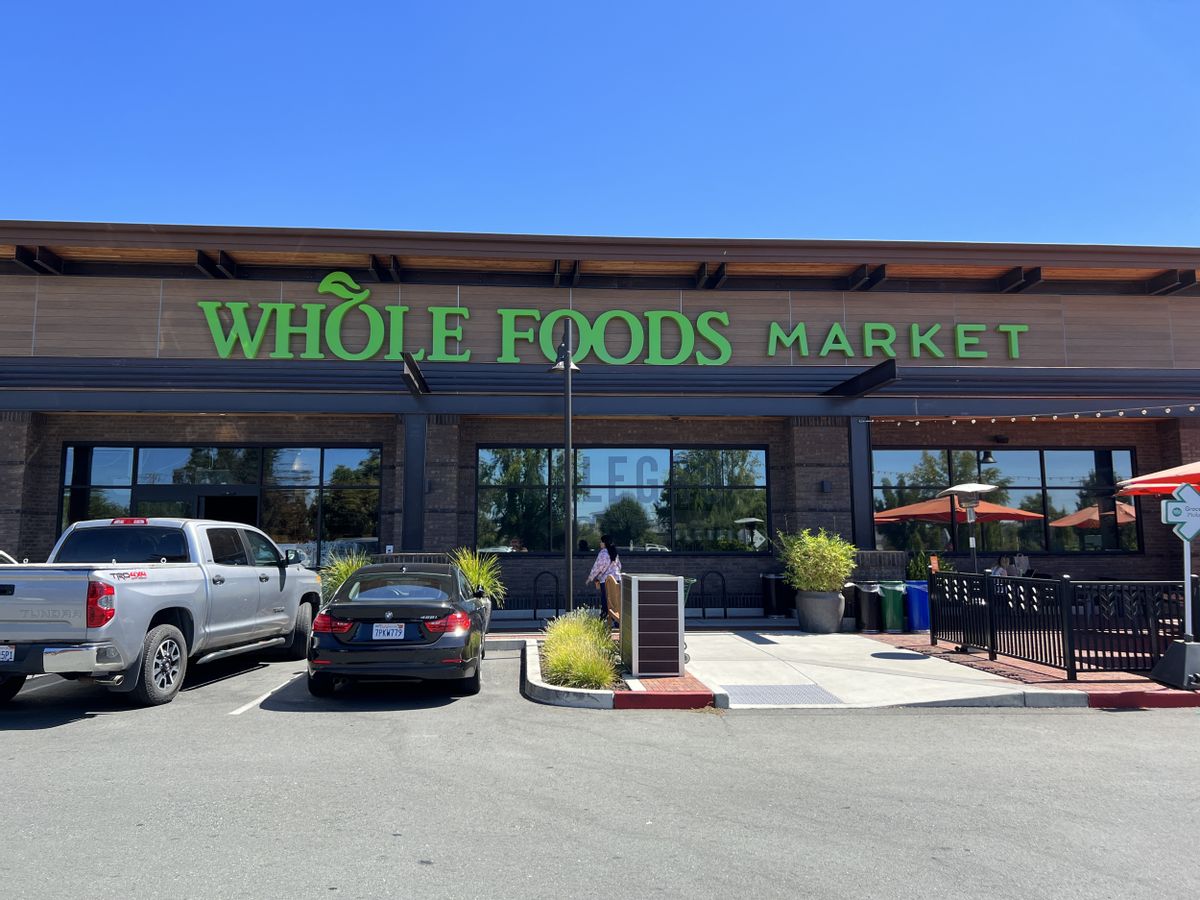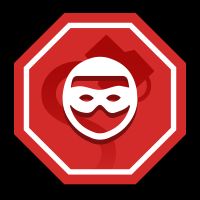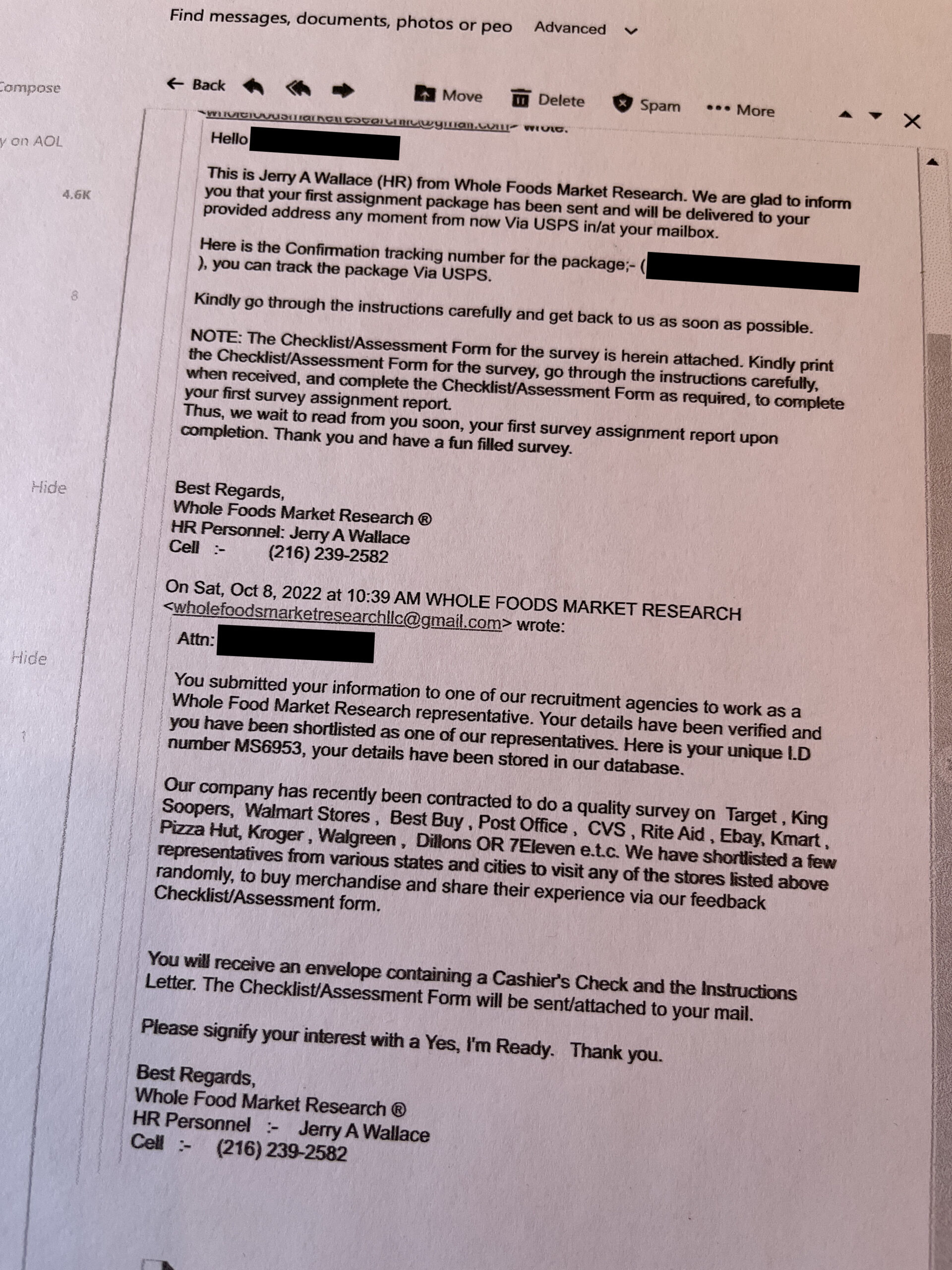In October 2022, we received reader mail about a "Whole Foods Market Research" scam. The scam arrives in the form of an email, text, or mailed letter, and claims that the recipient has been chosen to be a secret shopper for Whole Foods Market.
The goal of the scammer is to get the recipient to deposit a check into the recipient's bank account. However, unbeknownst to the recipient, the check is fake. The scammer is to quickly task the recipient to buy gift cards and then provide the identifying details on the front and back. Alternatively, the scammer might ask the recipient to initiate a wire transfer or money order to send back a partial amount of the funds from the check. The scammer claims that the recipient can keep a portion of the funds for the work. However, again, the check is fake, so recipients are spending their own money to buy gift cards for the scammers.
We reviewed one example of this scam that arrived as an email. It came from wholefoodsmarketresearchllc@gmail.com, which was not an official Whole Foods email address. It claimed to come from a person named Jerry A. Wallace, a purported human resources (HR) representative. A previous version of this scam named Wallace as a "project manager," according to scampulse.com. We found no evidence of a person with this name being a real employee for Whole Foods.
The original email, which contained several store name misspellings, read as follows:
wholefoodsmarketresearchllc@gmail.com wrote:
Attn: (name removed)
You submitted your information to one of our recruitment agencies to work as a Whole Foods Market Research representative. Your details have been verified and you have been shortlisted as one of our representatives. Here is your unique I.D. number MS6953, your details have been stored in our database.
Our company has recently been contracted to do a quality survey on Target, King Soopers, Walmart Stores, Best Buy, Post Office, CVS, Rite Aid, Ebay, Kmart, Pizza Hut, Kroger, Walgreen, Dillons OR 7Eleven e.t.c. We have shortlisted a few representatives from various states and cities to visit any of the stores listed above randomly, to buy merchandise and share their experience via our feedback Checklist/Assessment form.
You will receive an envelope containing a Cashier's Check and the Instructions Letter. The Checklist/Assessment Form will be sent/attached to your mail.
Please signify your interest with a Yes, I'm Ready. Thank you.
Best Regards,
Whole Foods Market Research©
HR Personnel :- Jerry A. Wallace
Cell :- (216) 239-2582
We called the phone number listed in the email. After several rings, a voice message was played that said, "The TextNow subscriber you are trying to reach is not available. Please leave your message after the tone."
The U.S. Federal Trade Commission (FTC) previously published a full report on this scam back in 2020:
People spotted signs of a fake check scam in the bogus Whole Foods secret shopper offer (which was from a scammer, not really Whole Foods). That’s when someone sends you a check and convinces you to deposit it and quickly send them money. In this scam, the recruiter would send shoppers a check for more than $2,000 and they would:
1. Cash or deposit the check immediately.
2. Buy gift cards with most of the money.
3. Keep about $450 as their pay.
4. Scratch the coating off the gift cards to show the PIN codes.
5. Send pictures of the cards’ front and back (with the codes) to the recruiter.If anyone ever tells you to deposit a check, withdraw money, and send it to someone, that’s a scam. When the check later turns out to be fake, the bank will want the money back. And if anyone tells you to go buy gift cards and share the PIN numbers, that’s a scam, too. Once the scammer has the PIN, they also have all the money from the cards.
The FTC said this scam can be reported at ReportFraud.ftc.gov. They also added, "If you already cashed a fake check and sent money to a scammer, find out how to report to gift card, wire transfer, and money order businesses."
In sum, both we and the FTC advise consumers to not respond to any emails, texts, or mailed letters that invite recipients to work as a secret shopper for "Whole Foods Market Research."


